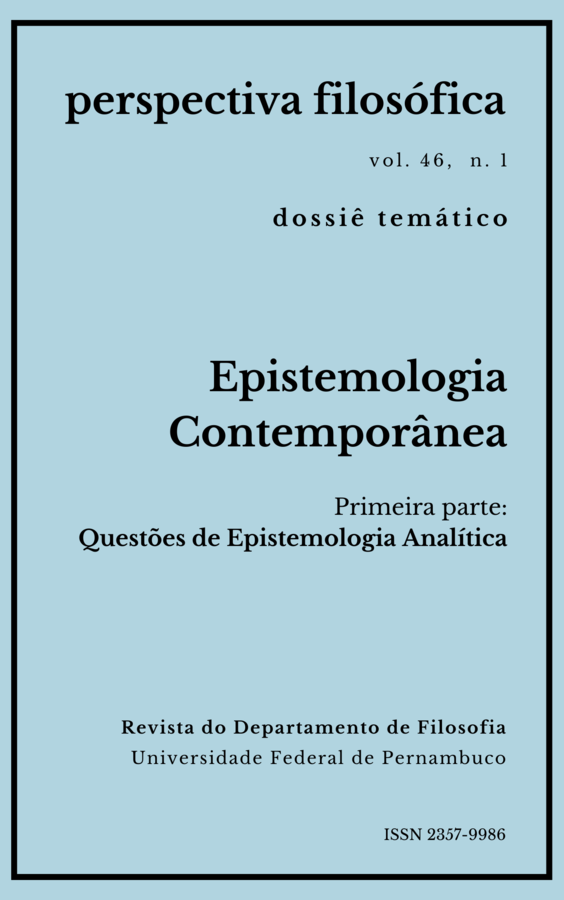O que é preciso para ser um externista em epistemologia?
DOI:
https://doi.org/10.51359/2357-9986.2019.247943Keywords:
internalism, externalism, justification, defeatersAbstract
In this paper, we will explore two related questions: (i) What are the fundamental aspects of the internalism vs. externalism dispute in contemporary epistemology?; (ii) Is externalism compatible with a no-defeater clause? Both issues spark controversy. We will argue that there is a suitable answer to our first question: the internalism vs. externalism dispute is at its core one about which role the mind-world relations play in the acquisition of epistemic justification. Based on that claim, we will hold that there is also a suitable answer to our second question: an externalist may well adhere to a nodefeater clause. Such results will allow us to show that some significant claims regarding the internalism vs. externalism dispute that people have made recently in the literature are incorrect.References
ALSTON, W. P. An Internalist Externalism. In: Synthese 74 (3): 265-283,1988.
ALSTON, W. P. Beyond “Justification”: Dimensions of EpistemicEvaluation. Cornell University Press, 2005.
BAKER-HYTCH, M.; & BENTON, M. Defeatism Defeated. PhilosophicalPerspectives 29 (1):40-66, 2015.
BEDDOR, B. Process Reliabilism’s Troubles With Defeat. ThePhilosophical Quarterly Vol. 65, No. 259, 2015.
BERGMANN, M. Internalism, externalism and the no-defeater condition.Synthese 110 (3):399-417, 1999
BERGMANN, M. Justification Without Awareness: A Defense ofEpistemic Externalism. Oxford University Press, 2006
BERGMANN, M. Externalist Responses to Skepticism. In: Greco, J. (ed),The Oxford Handbook of Skepticism. Oxford University Press, 2008.
BONJOUR, L. Externalist Theories of Empirical Knowledge. MidwestStudies in Philosophy 5 (1):53-73, 1980
BONJOUR, L. The Structure of Empirical Knowledge. Harvard UniversityPress, 1985.BONJOUR, L.; & SOSA, E. Epistemic Justification: Internalism Vs.Externalism, Foundations Vs. Virtues. Wiley-Blackwell, 2003
CARTER, J. A.; & PALERMOS, S. O. Epistemic Internalism, ContentExternalism and the Subjective/Objective Justification Distinction. In:American Philosophical Quarterly 53 (3): 231-244, 2016.
COMESAÑA, J. Evidentialist Reliabilism. In: Nous 44 (4): 571-600, 2010.
CONEE, E. & FELDMAN, R. Evidentialism: Essays in Epistemology.Oxford University Press, 2004.
COHEN, S. Justification and Truth. In: Philosophical Studies 46 (3): 279-295, 1984.
CHISHOLM, R. The Ethics of Requirement. American PhilosophicalQuarterly 1 (2):147 – 153, 1964.
DAVID, M. Truth as the Primary Epistemic Goal: A Working Hypothesis.In: Sosa, E., Steup. M., Turri, J. (eds.), Contemporary Debates inEpistemology. Wiley Blackwell, 2013.
FELDMAN, R. Justification Is Internal. In: Sosa, E., Steup. M., Turri, J.(eds.), Contemporary Debates in Epistemology. Wiley Blackwell, 2013.
FUMERTON, R. Metaepistemology and Skepticism. Rowan and LittlefieldUSA, 1995.
GETTIER, E. Is justified true belief knowledge?. IN: Analysis, 23, p. 121 –123, 1963.
GOLDMAN, A.. What is Justified Belief? In: George Pappas (ed.),Justification and Knowledge. Boston: D. Reidel. pp. 1-25, 1979.
GOLDMAN, A. Epistemology and Cognition. Harvard UniversityPress,1986.
GOLDMAN, A. Toward a Synthesis of Reliabilism and Evidentialism? Or:Evidentialism’s Troubles, Reliabilism’s Rescue Package. In: Dougherty, T.(ed.), Evidentialism and its Discontents. Oxford University Press USA,2011.
GOLDMAN, A.; & BEDDOR, B. Reliabilist Epistemology. In: Zalta, E.(ed.), Stanford Encyclopedia of Philosophy, 2015.
GOLDBERG, S. What Is the Subject-matter of the Theory of EpistemicJustification? In: Henderson, D. & Greco, J. (eds.), Epistemic Evaluation:Purposeful Epistemology. Oxford University Press UK, 2015.
GRECO, J. Achieving Knowledge: A Virtue-Theoretic Account ofEpistemic Normativity. Cambridge University Press, 2010.
GRECO, J. Justification is Not Internal. In: Sosa, E., Steup. M., Turri, J.(eds.), Contemporary Debates in Epistemology. Wiley Blackwell, 2013.
KVANVIG, J. Truth is Not the Primary Epistemic Goal. In: Sosa, E., Steup.M.,Turri, J. (eds.), Contemporary Debates in Epistemology. WileyBlackwell, 2013.
LASONEN-AARNIO, M. Unreasonable Knowledge. PhilosophicalPerspectives 24 (1):1-21, 2010.
LEHRER, K.; & COHEN, S. Justification, Truth, and Coherence. In:Synthese 55: 191-207, 1983.
MADISON, B. J. C. Epistemic Internalism. Philosophy Compass 5 (10):840-853, 2010.
NOZICK, R. Philosophical Explanations. Harvard University Press, 1981.
PLANTINGA, A. Warrant: The Current Debate. Oxford University Press,1993a.
PLANTINGA, A. Warrant and Proper Function. Oxford University Press,1993b.
POLLOCK, J. Knowledge and Justification. Princeton University Press,1974.
PUTNAM, H. Brains in a Vat. In: Reason, Truth, and History. CambridgeUniversity Press, 1981.
SENOR, T. The prima/ultima facie justification distinction in epistemology,IN: Philosophy and Phenomenological Research, 55, p. 551–566, 1996.
SOSA, E. Knowledge in Perspective. Cambridge University Press USA,1991.
SRINIVASAN, A. Radical Externalism. No prelo.
STEUP, M. Internalist Reliabilism. In: Philosophical Issues 14 (1): 403-425,2004.
Downloads
Published
Issue
Section
License
A Revista Perspectiva Filosófica orienta seus procedimentos de gestão de artigos conforme as diretrizes básicas formuladas pelo Conselho Nacional de Desenvolvimento Científico e Tecnológico (CNPq). http://www.cnpq.br/web/guest/diretrizesAutores que publicam nesta revista concordam com os seguintes termos:
Os autores mantém os direitos autorais e concedem à revista o direito de primeira publicação, sendo o trabalho simultaneamente licenciado sob https://creativecommons.org/licenses/by/4.0/deed.pt_BR que permite o compartilhamento do trabalho com reconhecimento da autoria e publicação inicial nesta revista.
Os autores têm autorização para assumir contratos adicionais separadamente, para distribuição não-exclusiva da versão do trabalho publicada nesta revista, com reconhecimento de autoria e publicação inicial nesta revista (Consultar http://opcit.eprints.org/oacitation-biblio.html).

Esta revista está licenciada com uma Licença Creative Commons Atribuição 4.0 Internacional.













